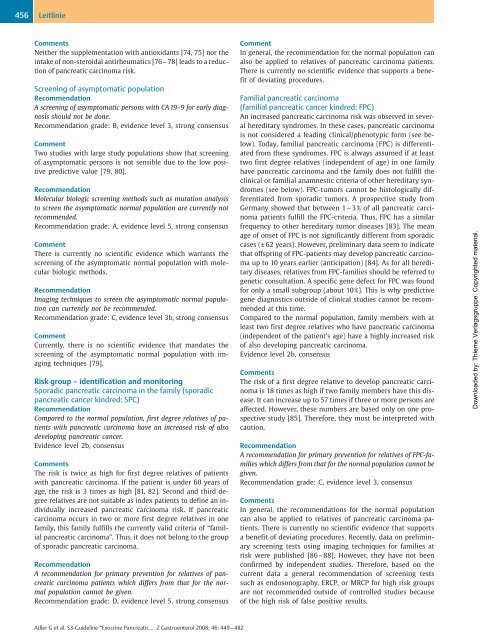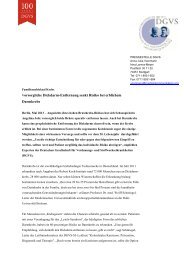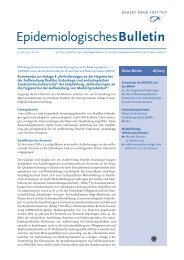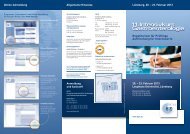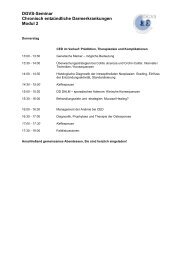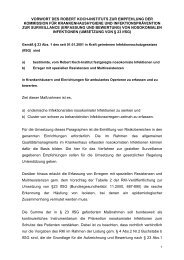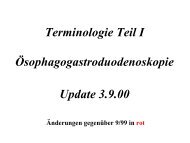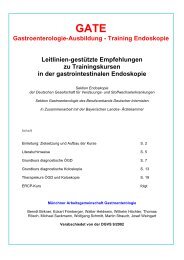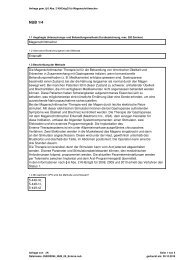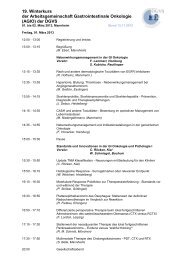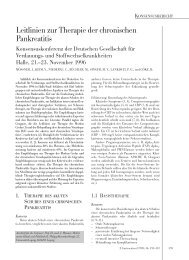S3-Guideline “Exocrine Pancreatic Carcinoma” 20071 ... - DGVS
S3-Guideline “Exocrine Pancreatic Carcinoma” 20071 ... - DGVS
S3-Guideline “Exocrine Pancreatic Carcinoma” 20071 ... - DGVS
Create successful ePaper yourself
Turn your PDF publications into a flip-book with our unique Google optimized e-Paper software.
456<br />
Leitlinie<br />
Comments<br />
Neither the supplementation with antioxidants [74, 75] nor the<br />
intake of non-steroidal antirheumatics [76–78] leads to a reduction<br />
of pancreatic carcinoma risk.<br />
Screening of asymptomatic population<br />
Recommendation<br />
A screening of asymptomatic persons with CA19–9 for early diagnosis<br />
should not be done.<br />
Recommendation grade: B, evidence level 3, strong consensus<br />
Comment<br />
Two studies with large study populations show that screening<br />
of asymptomatic persons is not sensible due to the low positive<br />
predictive value [79, 80].<br />
Recommendation<br />
Molecular biologic screening methods such as mutation analysis<br />
to screen the asymptomatic normal population are currently not<br />
recommended.<br />
Recommendation grade: A, evidence level 5, strong consensus<br />
Comment<br />
There is currently no scientific evidence which warrants the<br />
screening of the asymptomatic normal population with molecular<br />
biologic methods.<br />
Recommendation<br />
Imaging techniques to screen the asymptomatic normal population<br />
can currently not be recommended.<br />
Recommendation grade: C, evidence level 3b, strong consensus<br />
Comment<br />
Currently, there is no scientific evidence that mandates the<br />
screening of the asymptomatic normal population with imaging<br />
techniques [79].<br />
Risk group – identification and monitoring<br />
Sporadic pancreatic carcinoma in the family (sporadic<br />
pancreatic cancer kindred: SPC)<br />
Recommendation<br />
Compared to the normal population, first degree relatives of patients<br />
with pancreatic carcinoma have an increased risk of also<br />
developing pancreatic cancer.<br />
Evidence level 2b, consensus<br />
Comments<br />
The risk is twice as high for first degree relatives of patients<br />
with pancreatic carcinoma. If the patient is under 60 years of<br />
age, the risk is 3 times as high [81, 82]. Second and third degree<br />
relatives are not suitable as index patients to define an individually<br />
increased pancreatic carcinoma risk. If pancreatic<br />
carcinoma occurs in two or more first degree relatives in one<br />
family, this family fulfills the currently valid criteria of “familial<br />
pancreatic carcinoma”. Thus, it does not belong to the group<br />
of sporadic pancreatic carcinoma.<br />
Recommendation<br />
A recommendation for primary prevention for relatives of pancreatic<br />
carcinoma patients which differs from that for the normal<br />
population cannot be given.<br />
Recommendation grade: D, evidence level 5, strong consensus<br />
Adler G et al. <strong>S3</strong>-<strong>Guideline</strong> <strong>“Exocrine</strong> <strong>Pancreatic</strong>… Z Gastroenterol 2008; 46: 449–482<br />
Comment<br />
In general, the recommendation for the normal population can<br />
also be applied to relatives of pancreatic carcinoma patients.<br />
There is currently no scientific evidence that supports a benefit<br />
of deviating procedures.<br />
Familial pancreatic carcinoma<br />
(familial pancreatic cancer kindred: FPC)<br />
An increased pancreatic carcinoma risk was observed in several<br />
hereditary syndromes. In these cases, pancreatic carcinoma<br />
is not considered a leading clinical/phenotypic form (see below).<br />
Today, familial pancreatic carcinoma (FPC) is differentiated<br />
from these syndromes. FPC is always assumed if at least<br />
two first degree relatives (independent of age) in one family<br />
have pancreatic carcinoma and the family does not fulfill the<br />
clinical or familial anamnestic criteria of other hereditary syndromes<br />
(see below). FPC-tumors cannot be histologically differentiated<br />
from sporadic tumors. A prospective study from<br />
Germany showed that between 1 – 3% of all pancreatic carcinoma<br />
patients fulfill the FPC-criteria. Thus, FPC has a similar<br />
frequency to other hereditary tumor diseases [83]. The mean<br />
age of onset of FPC is not significantly different from sporadic<br />
cases (€ 62 years). However, preliminary data seem to indicate<br />
that offspring of FPC-patients may develop pancreatic carcinoma<br />
up to 10 years earlier (anticipation) [84]. As for all hereditary<br />
diseases, relatives from FPC-families should be referred to<br />
genetic consultation. A specific gene defect for FPC was found<br />
for only a small subgroup (about 10%). This is why predictive<br />
gene diagnostics outside of clinical studies cannot be recommended<br />
at this time.<br />
Compared to the normal population, family members with at<br />
least two first degree relatives who have pancreatic carcinoma<br />
(independent of the patient’s age) have a highly increased risk<br />
of also developing pancreatic carcinoma.<br />
Evidence level 2b, consensus<br />
Comments<br />
The risk of a first degree relative to develop pancreatic carcinoma<br />
is 18 times as high if two family members have this disease.<br />
It can increase up to 57 times if three or more persons are<br />
affected. However, these numbers are based only on one prospective<br />
study [85]. Therefore, they must be interpreted with<br />
caution.<br />
Recommendation<br />
A recommendation for primary prevention for relatives of FPC-families<br />
which differs from that for the normal population cannot be<br />
given.<br />
Recommendation grade: C, evidence level 3, consensus<br />
Comments<br />
In general, the recommendations for the normal population<br />
can also be applied to relatives of pancreatic carcinoma patients.<br />
There is currently no scientific evidence that supports<br />
a benefit of deviating procedures. Recently, data on preliminary<br />
screening tests using imaging techniques for families at<br />
risk were published [86 – 88]. However, they have not been<br />
confirmed by independent studies. Therefore, based on the<br />
current data a general recommendation of screening tests<br />
such as endosonography, ERCP, or MRCP for high risk groups<br />
are not recommended outside of controlled studies because<br />
of the high risk of false positive results.<br />
Downloaded by: Thieme Verlagsgruppe. Copyrighted material.


